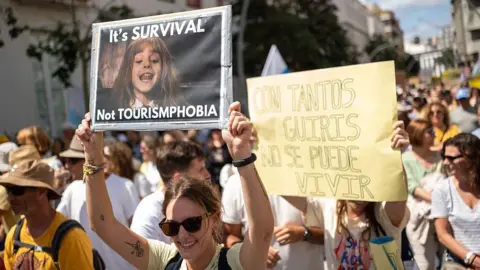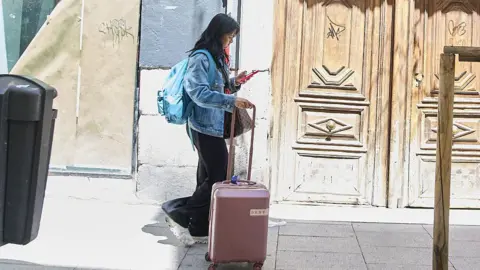 Getty Images
Getty ImagesThe Spanish government has called for the removal of the listings of nearly 66,000 properties on rental platform Airbnb on the grounds that they breach regulations for tourist accommodation.
The clampdown comes as protests against over-tourism have begun ahead of the summer season. Demonstrations in the Canary Islands on Sunday attracted thousands of people.
The minister for social rights, consumer affairs and the 2030 Agenda, Pablo Bustinduy, said the rental properties in question had “violated various norms regarding housing for tourist use”.
The announcement followed a Madrid court ruling that Airbnb must immediately withdraw from the market 4,984 of the properties cited by the ministry.
The properties are in six regions: Madrid, Andalusia, Catalonia, Valencia, the Basque Country and the Balearic Islands.
Bustinduy’s ministry is now awaiting further judicial rulings on the other 60,000 or so properties whose listings it deems unlawful.
According to the ministry, the properties it has identified either did not provide a licence number, provided an erroneous number, or did not specify the legal status of the owner to show whether they were renting on a professional basis or as a private individual.
He described the court’s decision as “a clear victory for those who fight to protect the right to housing”.
Bustinduy added that “it can be possible to ensure that no economic interest has priority over housing and that no company, however big or powerful, is above the law”.
Housing has emerged as Spaniards’ biggest concern in recent months, due to spiralling rental costs, particularly in larger towns and cities.
Read more: Spanish fightback against record tourism
The cost of an average rental has doubled over the last decade, while salaries have failed to keep up.
Tourist apartments have been identified by many as a major cause of the problem, depriving local residents of accommodation.
Spain is the world’s second most popular tourist destination after France, with 94 million foreign visitors in 2024, a 13% rise on the previous year.
Socialist Prime Minister Pedro Sánchez said earlier this year “there are too many Airbnbs and not enough homes”, and he promised to prevent the “uncontrolled” expansion of the use of properties for tourism.
 Getty Images
Getty ImagesSome local governments have also started to act against Airbnb.
Barcelona City Hall has said it will eliminate its 10,000 short-term tourist apartments by the end of 2028.
Others have taken a different approach. In recent months, Airbnb has reached agreements with local authorities in the Canary Islands, Ibiza and Murcia aimed at ensuring property owners comply with tourist rental rules.
Airbnb responded to the court ruling and Bustinduy’s announcement by insisting it would appeal against decisions linked to this case and that no evidence of rule-breaking by hosts had been provided.
It also cited a 2022 ruling by the Spanish Supreme Court which found that the responsibility for listing information lay with the host of each property, not the company, which was a “neutral intermediary” and not a real estate provider.
The firm also made a broader point about the Spanish housing problem.
“The root cause of the affordable housing crisis in Spain is a lack of supply to meet demand,” said a spokesperson. “Governments across the world are seeing that regulating Airbnb does not alleviate housing concerns or return homes to the market – it only hurts local families who rely on hosting to afford their homes and rising costs.”
Last summer, Spain saw a wave of protests against over-tourism in many popular destinations, with its impact on housing the biggest grievance.
With the number of foreign visitors to Spain fast approaching 100 million per year, the unrest is expected to continue this summer.
On Sunday, several thousand people took to the streets across the Canary Islands under the slogan “Canaries have a limit”.
In Majorca, a group called Menys Turisme, Més Vida (Less tourism, more life) is preparing for similar actions, with a protest scheduled for 15 June.
